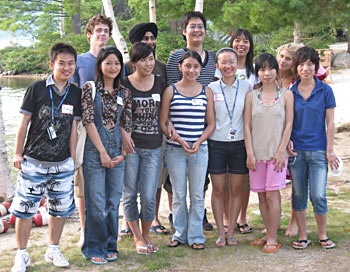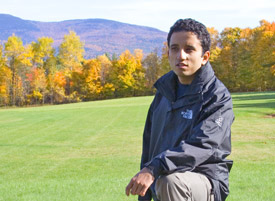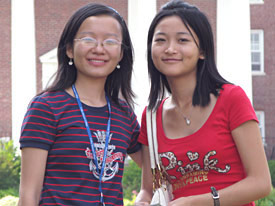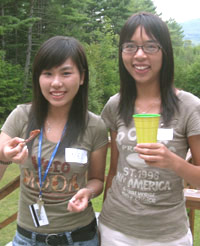At Home In a Distant Land: International Students at Colby-Sawyer College
After a long series of flights from Shanghai to Boston in early September, four Chinese students arrived at Logan Airport at 11 p.m. and hailed a taxi to New Hampshire. As they drew close to their final destination—Colby-Sawyer College—the car in front of them collided with a moose, forcing their taxi to slow abruptly. The students gasped as they passed the massive, unrecognizable animal sprawled on the road before them. They felt very far from home.
Mansi Luo, Yuan Gu, Zhu Ye (“Julia”) and Wei Guo had met months earlier through a Facebook group for accepted Colby-Sawyer students. There they had connected through their shared language, culture and plans to attend a small college almost 9,000 miles away in New Hampshire.

On campus, the Chinese students were joined by 10 other first-year students from the Bahamas, Ecuador, India, Ireland, Norway and Vietnam. They all arrived early for an informal orientation program for international students, led by their advisor, Cindy Benson, and David Elliott, director of the English as a Second Language (ESL) Program. Through the orientation program, the students were introduced to people and resources on campus, took required immunizations and English language tests, shopped for supplies, and met their local host families.
“This year we have a really strong group of international students, top notch,” says Benson. “It's important for them to know others who have much in common with them. They're facing the same adjustment issues and coming early as a group helps them to know they're not the only ones.”
Julia Ye says the program gave her and her fellow international students a good overview of college life and helped put them at ease. “Cindy and David did a lot to help us adapt to a new environment and give us a sense of belonging. I think the most important function is to help us become familiar with the college before the other freshmen arrive, since none of us had visited the campus before.” Wei Guo chimes in: “We wanted to be ready, just like other students.”
Though they struggled initially to understand each other's English and adjust to new surroundings, different kinds of food, and American culture, these students from around the world were drawn to each other at once. “We found a little family, all with the same experiences,” says Achic “Sisa” Castro of Ecuador. “We are all alone and from another country. We became very close to each other.”
Why They Study Abroad
Like students everywhere who choose to study abroad, these international students came to the United States to experience life in a different country and culture, and to improve their foreign language skills. Due to the pervasiveness of American media, many of these students are fairly fluent in our popular culture; some grew up with American movies, television shows, and music, and more recently they have connected to young Americans through the internet and social networking sites. The lure of America's image as a friendly, modern and open society appeals to some students who come from more traditional families and cultures.
Yet those who choose to travel far from home for college are also driven by more pragmatic concerns. Several international students believe higher education in the United States is superior to that of their homelands, and that they can find more academic rigor and scholarships here. They also perceive that the experience of studying abroad in the United States will give them an advantage in their careers once they return home.
Yuan Gu, a talkative and gregarious young man, attended a university in China for one year before he set off traveling around his country and Hong Kong for a couple of years. The Chinese universities are much larger and less personal than Colby-Sawyer, he says, with at least 20,000 students at each school and 200 students in many classes. Most students must select their field of study early on and cannot change their major. In their classes, Chinese students are taught to absorb information from their teachers rather than discuss or share ideas, according to Gu.
“The professor just writes on the board, and students take tests, never thinking about the material, never questioning if it's true. This was not the education I wanted. It wasn't suited for me,” Gu says. “Many people do what their family wants them to do—my mother hates the idea of me going so far away to school. But I'm only 19 and still want to explore and find the meaning of my life. I have to have courage—have to be brave. If you never try, you have no chance.”
Sisa Castro, who is soft spoken and confident, attended high school in Arizona for two years before seeking out a small college in New England. She wanted to continue gaining fluency in English and likes the way American schools offer strong academics and a variety of sports and other co-curricular programs, which her Ecuadoran schools didn't do. Castro intends to major in Exercise and Sport Sciences or Athletic Training and hopes to go on to graduate school in Sports Medicine.
“I've been really impressed with the relationship between students and professors here; they're really friends,” she says. “That's a huge difference from Ecuador, where you can't contradict your teacher. Here they are interested in your point of view.”

Both Harinder Singh from India and Anup Nepal of Nepal attended business-oriented secondary schools in their homelands and plan to major in Business Administration at Colby-Sawyer before returning to their native countries after college. Singh says his father encouraged him to study in the United States because he believes Indian firms prefer to hire employees with international experience.
Nepal, in his second year at Colby-Sawyer, says his exposure to computer technologies and the hands-on practical skills that are often part of American higher education will be huge incentives for companies in Nepal to hire him. “At home you learn theory in school, and everything is hand-written,” he says. “All the things we study here (in the U.S.) are an advantage. We learn to use all the technology that America has to offer.”
Many international students are savvy shoppers who conduct extensive research before choosing which colleges to apply to. They scoured the web for U.S. colleges with strong academic reputations, the right majors, an appealing look and location, and a slew of scholarship opportunities. Both Wei Guo and Julia Ye discovered that Colby-Sawyer was ranked as a top comprehensive baccalaureate college in the Northeast by U.S. News and World Report, for example, and Ye found another resource that designated the college as a good choice for international students.
Duong “Zui” Nguyen of Vietnam began her search by Googling “small schools in New England” and Colby-Sawyer popped up first. As she delved deeper, she found that it met her criterion as a place where she would be academically challenged and feel at home. “One of my cousins studied abroad and said I should too because I needed to get more independent,” she says. “I've been preparing for this for two or three years, and I'm feeling much better now. I feel excited about a new country, new people, this new world.”
First Impressions
In the flush of their first few weeks, these students are still adjusting to college life, which is made more challenging by their varying degrees of mastery in English. Yet their transition has been eased by the warm welcome they've received from other students and community members.
In the dining hall, American students often ask Yuan Gu how to use chopsticks, and now some will stop by to tell him they're making progress in learning to use them. Gu finds it sweet and amusing that they take an interest in his culture as well. “But I don't go around with a fork!” he says, laughing. “I find people very friendly, and they want to help each other. I have friends who are teaching me a lot.”

What surprised him most about college here is that professors and students can also become friends, as he has with and his professor and advisor, Randy Hanson. “It's cool; I'm really happy I can talk with a professor. And he really helps me out a lot,” says Gu. He also finds the campus beautiful and the air amazingly clear and fresh, but he concedes the academic pressure here is “very great.” He and several other international students were accepted into the Wesson Honors Program, which may intensify the workload. “There's lots of reading and writing and papers to do,” he says. “In China, you may have to do one paper in a year, here it's 10 in a week or two.”
Similarly, Sisa Castro is charmed by people's friendliness and even more so by their interest in her as a person and their concern with her well-being. “When I first came everyone was asking, How was your day? How are you feeling? Is everything OK? It's helped me that people are worried about me,” she says. “In the dorm we get together and talk about our experiences. It's just really nice that people care about you.”
All of the international students interviewed say they feel overwhelmed by the amount of work they have for their classes, but they hope it will become easier in time. They are also adjusting to American food, which is harder for some than others. Julia Ye and Wei Guo have talked to the dining hall cooks, who are open to making special Chinese dishes for them.
“I will bring them some recipes for easy dishes,” says Guo. When asked if she was at all homesick, she says, “I have been preparing my heart to come to the U.S. for three years now. When I arrived at Colby-Sawyer I felt like I had been here before, but I knew I hadn't. It just feels like home.”

Ye says she's becoming more confident about sharing her opinions and taking part in class debates. “In sociology class my professor asked, 'Which country do you think is the best in the world?'” she says. “I stood up and said, 'China is the best country in the world!'”
Like many others, Zui Nguyen felt lonely and nervous when she first arrived, something that her host family from New London has helped her with. They've taken her on outings to the White Mountains and Squam Lake, as well as to dinner and for overnight stays at their home. Zui has also made friends here at the college, especially through the Cross Cultural Club.
“I'm feeling less lonely now,” she says. “I'm getting used to it. The other students are so nice, and so is my roommate. The students make me feel so close, like I'm not a foreigner.” Nguyen is also happy that her height (5' 7”) no longer makes her stand out. “I'm considered a giant in Vietnam!” she says with a smile.
From Friendly to Friendship
The large number of incoming international students this fall is part of the college's renewed commitment to increasing diversity on campus, according to David Elliott, ESL director, who credits the leadership of President Tom Galligan and Greg Matthews, vice president for Enrollment Management. Jen Jacques, the college's senior associate director of Admissions and director of International and Diversity Recruitment, helped to bring in the new class.
“We've been very lucky with the students who've come this year; they're smart, they're worldly, but it's an interesting combination to me of sophistication and innocence,” says Elliott. “It's so refreshing because they're not uptight or prudish in any way but they don't feel they have to experience everything life has to offer by the time they're 15.
“They're also very brave,” he adds. “They are people who chose to go to school thousands of miles from their families and what they know. It takes a certain amount of courage, confidence and faith to make that kind of decision.”
Cindy Benson, the college's advisor for International Students, has worked hard to build connections for the students both on and off campus. The first-year students all live on campus, some in an international student suite, yet Benson has arranged for host families in the area as well as for student mentors for each student. She also advises the Cross Cultural Club, which this year has grown to include more than 50 students and serves as one of the primary focal points for international students' social lives.
Recently 35 students and four international staff and faculty members attended a Fall Harvest Dinner at the home of Baird Health and Counseling Director Jackie Webb. Home-cooked local foods, international music, a ping pong tournament, and even some salsa dancing made for a fun evening and helped to deepen friendships between some of the American students and the students from other cultures.

While international students tend to “stick together,” Benson encourages American students to reach out and get to know these students. “The best thing (American students) can do is push through the language barrier and talk to the international students, even if they're in groups and even if it's hard to communicate at first,” she says. “Don't let the difficulties in communication stop you from starting a friendship and making conversation.”
Elliott expresses concern that Americans, so accustomed to our culture at the center of power, often lack curiosity about the world's other cultures. He encourages American students to go beyond friendliness toward people of other cultures to a deeper and more potentially rewarding personal commitment to friendship. “It's easy to smile and say 'how are you,' harder to extend yourself in a way that has meaning,” he says. “But being friendly is different than being a friend.”
One way international students connect to others is through their involvement in campus clubs and activities. Anup Nepal seems to have pushed involvement nearly to the extreme, serving as a senator for student government, treasurer of the Cross Cultural Club, vice president of SIFE, as well as committing to community service and working at Lethbridge Lodge 20 hours a week.
“I just want to be involved, and I need to support myself somewhat,” he says. “I like to work with students and try to find solutions to their problems.” In his home country, economic conditions have worsened and many workers are on strike, which he says has begun to affect university students as well. “It's been hard for students (in Nepal),” he says. “I think I made a good choice in coming here. My mentality would be completely different there.”
Sisa Castro also seems happiest when she's busy; she runs cross country, is involved with the CSC Players, Cross Cultural and Community Service Clubs, works in the dining hall several hours a week, and is thinking about joining the Christian Fellowship Club. “It's my personality; I can manage my time well if I have a lot to do,” she says.
She, like her fellow international students, misses her family and talks to them often, but she's adjusting, with the help of a busy schedule and new friends. “I honestly feel like Colby-Sawyer is my second family, my home. I feel very good here.”
-Kimberly Swick Slover


